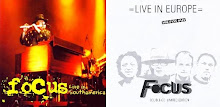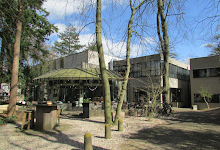Archive number: 59
Title: Father Bach
Title: Father Bach
Main Album: Mother Focus
Track number: 12
Genre: Progressive Rock Instrumental
Studio: Decca Studios, Hollywood, Los Angeles, California (later Studio 55)
Length: 1' 32”
Composer: J S Bach arranged Van Leer
Musicians: Jan Akkerman - Electric guitars; Thijs Van Leer – Hammond organ; Bert Ruiter – Bass
Producer: Hubert Terheggen/Focus
Engineer: Eric Prestidge
Label: LP – Polydor, Atco, Philips, EMI
Date of recording/release: Recorded 1975, released October 1975. LP – 1975, 1977, CD – 1988
Notes: The title is a nice joke here as it not only balances the track Mother Focus but also acknowledges the debt to the master Focus owe. Van Leer's organ, Akkerman's mostly 'violined' guitar and Ruiter's bass run through a short piece from the opening chorale of J S Bach's St Matthew Passion of 1729 (BWV 244). Van Leer turns to the piece more than once on his Introspection albums.
Track number: 12
Genre: Progressive Rock Instrumental
Studio: Decca Studios, Hollywood, Los Angeles, California (later Studio 55)
Length: 1' 32”
Composer: J S Bach arranged Van Leer
Musicians: Jan Akkerman - Electric guitars; Thijs Van Leer – Hammond organ; Bert Ruiter – Bass
Producer: Hubert Terheggen/Focus
Engineer: Eric Prestidge
Label: LP – Polydor, Atco, Philips, EMI
Date of recording/release: Recorded 1975, released October 1975. LP – 1975, 1977, CD – 1988
Notes: The title is a nice joke here as it not only balances the track Mother Focus but also acknowledges the debt to the master Focus owe. Van Leer's organ, Akkerman's mostly 'violined' guitar and Ruiter's bass run through a short piece from the opening chorale of J S Bach's St Matthew Passion of 1729 (BWV 244). Van Leer turns to the piece more than once on his Introspection albums.
A note on the St Matthew passion by J S Bach (from Wikipedia)
J S Bach (185-1750) was a German composer and organist whose sacred and secular works for choir, orchestra and solo instruments drew together the strands of the Baroque period and brought it to its ultimate maturity. Although he introduced no new forms, he enriched the prevailing German style with a robust contrapuntal technique, an unrivalled control of harmonic and motivic organisation in composition for diverse musical forces, and the adaptation of rhythms and textures from abroad, particularly Italy and France. Revered for their intellectual depth and technical and artistic beauty, Bach's works are many. While his fame as an organist was great during his lifetime, he was not particularly well-known as a composer. His adherence to Baroque forms and contrapuntal style was considered "old-fashioned" by his contemporaries, especially late in his career when the musical fashion tended towards Rococco and later Classical styles. A revival of interest and performances of his music began early in the 19th Century, and he is now widely considered to be one of the greatest composers in the Western tradition.
The St. Matthew Passion (Matthäuspassion) (also, Matthæus Passion), BWV 244, is a musical composition written by Bach for solo voices, double choir and double orchestra, with a libretto by Picander (Christian Friedrich Henrici). It sets chapters 26 and 27 of Matthew's Gospel to music, with interspersedchorales and arias.
Written in 1727. Only two of the four (or five) settings which Bach wrote have survived; the other is the St John. The St Matthew was probably first performed on Good Friday (April 11) 1727 in the Thomas Kirche in Leipzig, where Bach was Kapellmeister. He later revised it, performing it again on March 30, 1736, this time including two organs in the instrumentation. The St Matthew was not heard outside of Leipzig until 1829, when Felix Mendelssohn performed an abbreviated and modified version in Berlin to great acclaim. Mendelssohn's revival of the St Matthew brought Bach's music, particularly the large-scale works, to a public and scholarly attention that has persisted into the present era.





















No comments:
Post a Comment